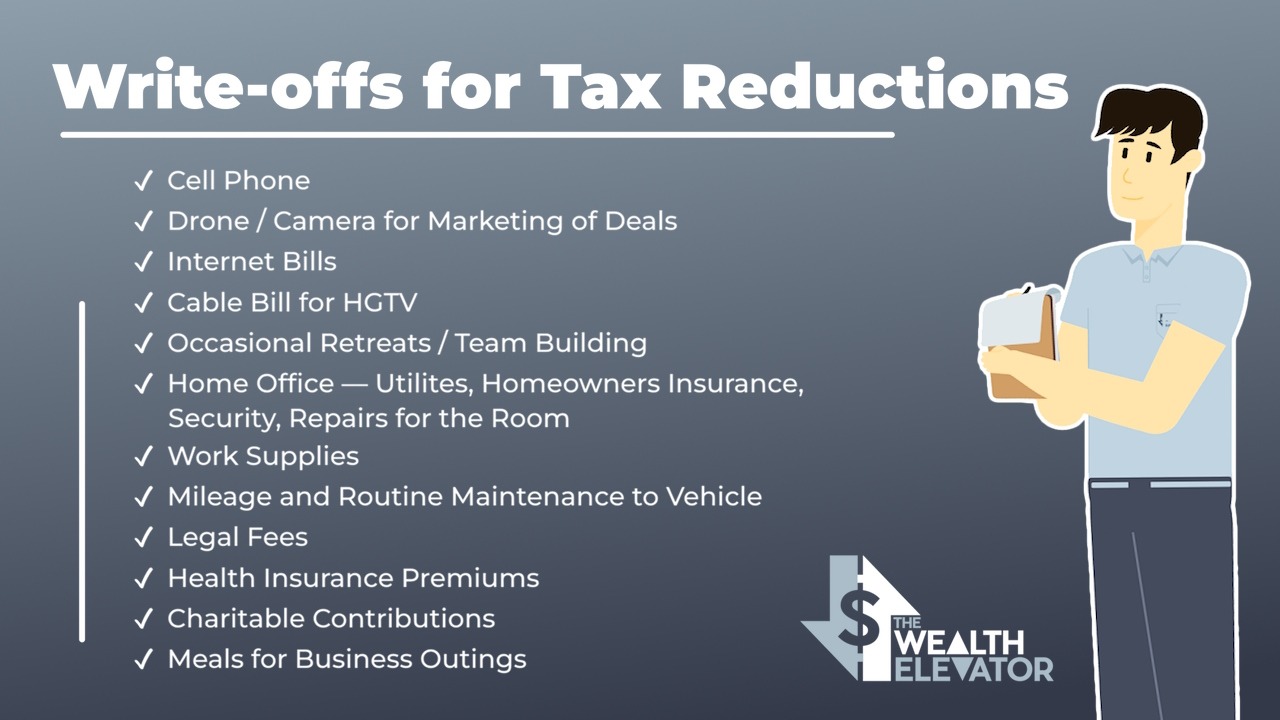Accredited Investors !
8 Ways to Eliminate Capital Gains ?
Join our Investor Club ,
Gain access to the
complete Tax and Asset Protection eCourse ,
And elevate
your passive investing!
Start Here: Basics
Taxes, death, and change are constants. Nobody can alter that! What counts most is how you can mitigate its effects, to live the good life you deserve.
Depreciation Recapture
In the world of real estate investing, understanding the nuances of taxes is crucial for optimizing returns. One key aspect that demands attention is depreciation recapture. Here we’ll delve into the basics and strategies around managing depreciation recapture, with insights from both an experienced investor and a CPA.
Accredited Investors !
Want to learn about
8 Ways to Eliminate Capital Gains ?
Join our Investor Club ,
and gain access to the
complete eCourse …
free.
Ordinary vs. Passive Income:
The journey starts with distinguishing between ordinary and passive income. While ordinary income is subject to various taxes, the goal for investors is to transition to passive income, generated without active involvement and benefiting from different tax treatments. This transition is often facilitated through leveraging depreciation and passive activity losses (PALS) in real estate.
Depreciation Basics:
Depreciation involves deducting the cost of property improvements over time. The red portion of a property, representing improvements, is depreciable, while the green portion (land) is not. Single-family homes allow for depreciation over 27 years, but larger deals benefit from cost segregation studies, accelerating depreciation for components with shorter lifespans.
Cost Segregation Studies:
Cost segregation studies break down property components for faster depreciation. While larger deals justify the cost of these studies, caution is advised against cheaper, potentially unreliable alternatives. A good study allows for front-loading depreciation, offering immediate tax advantages.
Understanding Passive Activity Losses
PALS are derived from the improvement portion of real estate and play a pivotal role in offsetting passive income. Investors can strategically utilize PALS to minimize tax liability and enhance overall returns.
Real-Life Examples:
Real-life examples illustrate how depreciation and PALS impact investors. A case study involving a Texas property showcases the significance of accelerated depreciation. While depreciation recapture becomes inevitable upon selling, the benefits of taking depreciation upfront can outweigh the future tax implications.
Tax Implications at Exit:
Upon selling a property, investors face three tax considerations: long-term capital gains, recapture tax, and ordinary income tax. Long-term capital gains are taxed at 15%, recapture tax (25% max) applies to stored-up passive losses, and ordinary income tax accounts for the remainder. Bonus depreciation can lead to upfront tax savings, providing an edge even with future recapture.
Navigating depreciation recapture requires a strategic approach. Investors must weigh the benefits of immediate tax advantages against future recapture liabilities. Building a relationship with a knowledgeable CPA is crucial for making informed decisions and optimizing tax strategies throughout the investment journey.
Remember, the world of real estate taxation is nuanced, and individual circumstances vary. It’s advisable to seek personalized advice and stay informed about changes in tax laws that may impact your investment strategy.
***Remember, tax laws are complex and subject to change, so it’s crucial to seek advice from a qualified tax professional who can provide guidance tailored to your specific situation and the current tax laws in your jurisdiction.
Tax Avoidance vs. Tax Evasion
In one of my former podcast episodes, I sat down with former IRS special agent Robert Norland shared valuable insights into the IRS’s criminal investigation division and shed light on crucial aspects of tax strategies and legal pitfalls to avoid.

Want to learn about a little-known
but incredibly valuable tax write-off strategy?
Click to check out our article about
the "De Minimis" Safe Harbor on the Blog!
Looking For
A Good CPA ?
If you would like a referral to the team that we use ...
please click this button , complete the form ,
and we will be in contact within 2 - 3 business days !
Request a ReferralThe IRS’s Specialized Role:
Norland highlighted the unique position of the IRS in dealing with tax crimes, explaining that the agency’s criminal investigation division is solely responsible for investigating tax-related offenses. Unlike other law enforcement agencies such as the Secret Service, DEA, FBI, or Homeland Security, the IRS has exclusive jurisdiction in tax crimes. Out of the IRS’s vast workforce, approximately 2,000 individuals are designated as criminal investigators, operating at a level comparable to other specialized agents in law enforcement agencies.
Intersection of Law Enforcement and Accounting:
Drawing from his experience, Norland emphasized the marriage between law enforcement and accounting within the IRS’s criminal investigation division. Special agents utilize their accounting skills to track tax evaders and money launderers globally, making them the world’s financial investigators.
Tax Strategies and Audits:
The discussion touched upon common tax strategies, such as real estate professional status, where individuals may attempt to use passive losses to offset their adjusted gross income. Norland cautioned against common misconceptions, such as obtaining a real estate license as a means to claim real estate professional status. He explained that the IRS primarily functions as a collector and assessor of taxes, assessing situations and determining tax dues.
Civil vs. Criminal Investigations:
There is a critical difference between civil and criminal investigations. In civil cases, the burden of proof is on the taxpayer to demonstrate the legitimacy of deductions or losses. However, in criminal investigations, deductions are automatically assumed until the government proves willful intent beyond a reasonable doubt. Norland provided examples to illustrate that while discrepancies might be scrutinized in civil cases, criminal investigations typically focus on substantial tax losses and intentional evasion.
Thresholds for Criminal Sentences:
Addressing concerns about potential criminal charges, Norland explained that the sentencing guidelines for tax-related crimes do not specify a dollar limit. However, he emphasized that criminal investigations usually target cases with significant tax losses, ranging from $40,000 to $50,000 or more.
Distinguishing Tax Evasion and Tax Avoidance:
Norland clarified the distinction between tax evasion and tax avoidance. Tax evasion involves intentionally avoiding paying owed taxes, whereas tax avoidance is the legal practice of minimizing tax liability through legitimate means.
Asset Protection
Legal Strategy
This is a sample from our comprehensive Masterclass. Join our investor club for free access to the full course!
Here's your
FREE GIFT !
We're proud to partner with Anderson Tax Advisors
to provide you with a 45-minute Asset Protection Strategy Session...
Completely FREE.
Click below to book now!
Book Your Tax Strategy SessionNavigating IRS Audits
What To Do When You Receive a Letter
Willfulness: The Key Distinction
The crux of tax evasion versus tax avoidance often hinges on the element of willfulness. Tax evasion involves intentional wrongdoing, where individuals knowingly engage in fraudulent activities like falsifying documents, maintaining second sets of books, or providing misleading information to investigators. Willfulness is about knowingly doing the opposite of what is right. It extends beyond mere mistakes and requires an intentional deviation from tax regulations.
Materiality and Intent: Deciphering Audit Triggers
IRS audits aren’t triggered by innocent errors, such as a transposing mistake in a tax return. The focus is on matters of material importance, where intentional actions significantly deviate from tax norms. This might include adding zeros to deductions or engaging in deceptive practices, like maintaining a second set of books. The willful nature of such actions becomes a red flag for IRS scrutiny.
Probability of Getting Flagged: The Unveiling of IRS Audits
The likelihood of getting flagged or audited by the IRS is relatively low, often ranging from 1% to 2% based on income levels. Audits usually begin with a letter addressing a mismatch of information on a tax return. This might involve unreported transactions, such as a property sale absent from the tax return but documented in the IRS system via a 1099 form.
IRS Investigations: From Mismatch to Criminal Inquiry
Most audits or IRS correspondence stem from a mismatch of information, signaling potential discrepancies in reported income or deductions. However, in some cases, a tax return might be pulled for audit based on various factors. Auditors are trained to identify “badges of fraud,” including suspicious documentation, false records, or consistently questionable financial activities. When such flags arise, the IRS may escalate the matter to a criminal investigation.
Seeking Professional Assistance: Navigating the IRS Maze
When faced with an IRS inquiry, individuals often contemplate seeking professional help. While smaller discrepancies may be addressed without professional assistance, the decision hinges on a cost-benefit analysis. For more substantial tax issues, involving a qualified tax professional becomes crucial, especially as audits progress from a simple mismatch letter to a comprehensive review of the entire tax return.
Debunking Misconceptions: The Alleged Influx of Armed IRS Agents
Recent headlines about the IRS hiring an “elite force” of armed agents caused considerable concern. However, the reality is more nuanced. The IRS, facing retirements and attrition, needs to replenish its workforce to maintain tax compliance. The alleged 87,000 armed IRS agents, as propagated in some reports, is a gross misrepresentation. In truth, there are only around 2,000 special agents with firearms, and their recruitment and training are meticulous processes.
Conclusion: Striking a Balance in Tax Compliance
While tax compliance is a necessary aspect of a functioning society, it’s essential to understand the intricacies of IRS investigations. From willfulness in intentional tax actions to audit triggers and the probability of getting flagged, navigating the IRS landscape requires a careful understanding of tax laws. Seeking professional guidance becomes paramount, especially when audits progress beyond initial correspondence. In essence, maintaining a balance between tax responsibility and informed decision-making is key to a hassle-free tax experience.
Finding a CPA
Book a free call here with one of our vendors!
Please let us know if you need a referral to 💼 CPA ⚖️ Lawyer or other vendor here.
Please note that our CPAs and other vendors change over time. We always want to stay neutral for an example provide you with multiple Solo40k providers for you to decide who you like best!
Tax Considerations for 2025
The following is not tax/legal advice, see the list below of 2024-2025 tax considerations that are still up in the air:
Extension (or Expiration) of the 2017 Tax Cuts and Jobs Act (TCJA)
What Might Change: Many of the individual-side provisions (such as lower income tax brackets, the higher standard deduction, and the 20% pass-through deduction) expire after 2025.
Impact on Investors: If not extended, taxpayers could face higher marginal rates and lose popular deductions, resulting in higher overall tax bills—particularly for small-business owners, freelancers, and real estate investors.
Possible Return of the Alternative Minimum Tax (AMT) for More Taxpayers
What Might Change: Under TCJA, far fewer people are subject to AMT. Once those TCJA provisions expire, the old AMT thresholds could snap back into place.
Impact on Investors: High-income earners, especially those in high-tax states who previously avoided AMT thanks to the TCJA’s higher exemptions, might be pulled back into it. AMT can reduce or eliminate deductions like state and local taxes (SALT).
State and Local Tax (SALT) Deduction Cap Adjustments
What Might Change: The current SALT deduction is capped at $10,000. Talks include raising that cap—possibly doubling it for married filers—or reverting to pre-2018 rules.
Impact on Investors: Those who own property in high-tax states or who pay large amounts of state income tax could either see a bigger federal deduction (if the cap is raised) or no change (if the cap remains). But the politics are contentious and still very uncertain.
Shifting Treatment of Tips
What Might Change: Proposals exist to exempt tips from federal income tax (though likely still subject to payroll taxes). This would be a brand-new carve-out.
Impact on Investors & Business Owners: Hospitality and service businesses could see changes in employee wage structures and labor costs. For individuals who earn tips—or have family members who do—this could yield tax savings. It may also influence hiring in tipped industries if labor becomes more affordable overall.
Overtime and Social Security Tax Exemptions
What Might Change: Some proposals would make overtime pay or Social Security benefits partially or fully exempt from federal income tax.
Impact on Retirees & Employees: Retirees who rely on Social Security might keep more in their pocket if benefits are no longer taxed. Overtime-exempt pay could encourage more people to work extra hours if it’s taxed less. Both ideas are politically complex and still lack detail.
Child Tax Credit (CTC) Changes
What Might Change: The TCJA doubled the CTC from $1,000 to $2,000 and raised phaseout thresholds. The enhanced CTC expires after 2025. Lawmakers may debate making it permanent, adjusting the amount, or changing eligibility.
Impact on Investors with Families: Families will want to watch closely. If the credit decreases or more children become ineligible, overall tax bills could climb—affecting disposable income, potential savings, and investment dollars.
R&D Expensing and Bonus Depreciation
What Might Change: Pre-2022 rules allowed for generous “bonus depreciation” and immediate expensing for R&D costs. Those have begun phasing down or reverting to slower write-offs.
Impact on Entrepreneurs & Real Estate Investors: If bonus depreciation (or full expensing of certain capital purchases) comes back, that can sharply reduce tax in the year of purchase. Real estate investors, tech start-ups, and manufacturing businesses would benefit from faster deductions, possibly increasing cash flow and reinvestment.
Further Corporate Tax Rate Adjustments
What Might Change: The 2017 reform brought the corporate rate down to 21%. Some lawmakers want it even lower for domestic manufacturing; others argue that 21% is “just right.”
Impact on Investors: If you hold C-corp shares, a lower rate could improve after-tax earnings and possibly boost stock valuations in the long run. Pass-through business owners might see less of a direct benefit but should watch for any interplay (such as a smaller 20% pass-through deduction).
Repeal or Reduction of Green Energy Credits from the Inflation Reduction Act
What Might Change: Part of the “pay-for” discussion includes partially repealing or limiting recent green energy incentives to offset other tax cuts.
Impact on Investors: If you’ve planned to invest in solar, EVs, or other clean-tech opportunities for tax credits, keep an eye on whether any of those credits get scaled back. It could alter ROI calculations for sustainable energy projects.
Tariffs as a ‘Hidden’ Tax Offset
What Might Change: Tariffs can raise significant revenue (up to $1–3 trillion over 10 years). The question is whether higher or broader tariffs might be used in lieu of or alongside tax hikes to pay for new cuts.
Impact on Investors: Tariffs can drive up costs for imported goods and materials, potentially hitting profit margins for businesses dependent on foreign inputs. This can trickle down into consumer prices, affecting overall economic conditions and possibly investment returns.
Short-Term vs. Permanent Extensions
What Might Change: Congress often uses “temporary” extensions—like a 4- or 5-year renewal of provisions—to reduce headline costs. However, these can suddenly expire if not renewed.
Impact on Investors: Planning gets trickier with short-term tax breaks. If key tax benefits (like bonus depreciation) are extended only a few years, you may want to time major purchases or real estate acquisitions to maximize short-lived benefits.
Uncertain Timing of Legislation
What Might Change: Lawmakers might tackle big, controversial issues (immigration, border funding, energy) before focusing on taxes. Or they could bundle everything into one large bill.
Impact on Investors: Delays often push final tax deals to the last minute, leaving little time to react. Individuals filing early might not capture late-year changes; those waiting until October might pivot faster if big tax breaks (or hikes) get enacted retroactively to January 2025.
Why Delaying Your Filing Might (or Might Not) Help
If significant tax law changes happen late in 2025 and are applied retroactively, waiting to file (i.e., filing in October) might give you a clearer picture of which deductions, credits, or rates apply.
On the other hand, filing early could still be beneficial if your situation is straightforward or if legislation remains stalled. Some changes might not become effective until after 2025 or might only pass at the very end of the year.
Consult your CPA or tax advisor before making big decisions—especially in a year when several moving parts could alter your tax picture overnight. By remaining aware of potential shifts, individual investors and entrepreneurs can make smarter calls about everything from retirement contributions to real estate investments, all while keeping a close eye on how final legislation will shape your 2025 tax bill.
Here's your
FREE GIFT !
We're proud to partner with Anderson Tax Advisors
to provide you with a 45-minute Asset Protection Strategy Session...
Completely FREE.
Click below to book now!
Book Your Tax Strategy SessionLooking For
A Good CPA ?
If you would like a referral
to the team that we use ...
please click this button ,
complete the form ,
and we will be in contact
within 2 - 3 business days !
begin your journey to financial freedom!
My name is Lane Kawaoka, and I hope my blog/podcast will help families realize the powerful wealth-building effects of real estate so they can spend their time on more important, instead of working long hours and worrying about their financial troubles. There are a lot of successful families with good jobs (teachers / engineers / programmers / finance) yet they struggle to make ends meet financially. It is their kiddos who ultimately get the short end of the stick. Being a Latch-Key Child growing up, both my parents had to work and I was left home alone after school to fiddle with my thumbs.
With Real Estate you are able to grow your wealth exponentially faster than the conventional 401K’s and stock investing, therefore you are able to escape the dogma of working 50+ hour weeks at a job that is unfulfilling. And if you are one of the lucky ones who happen to do what you enjoy… well good for you 😛
Money is not everything but it is important because it gives you the freedom to live life on your terms.
Annoyed by the bogus real estate education programs out there (that take money from people who don’t have it in the first place), I set out to make this free website to help other hard-working professionals, the shrinking middle-class. I hope to dispel the Wall-Street dogma of traditional wealth-building, and offer an alternative to “garbage” investments in the 401K/mutual funds that only make the insiders rich. We help the hard-working middle-class build real asset portfolios, by providing free investing education, podcasts, and networking, plus access to investment opportunities not offered to the general public.
“The true meaning of wealth is having the freedom to do what you want, when you want, and with whom you want.
Building cash flow via real estate is the simple part. The difficult part occurs after you are free financially to find your calling and fulfillment.
But that’s a great problem to have ;)”
excerpt from The One Thing That Changed Everything







